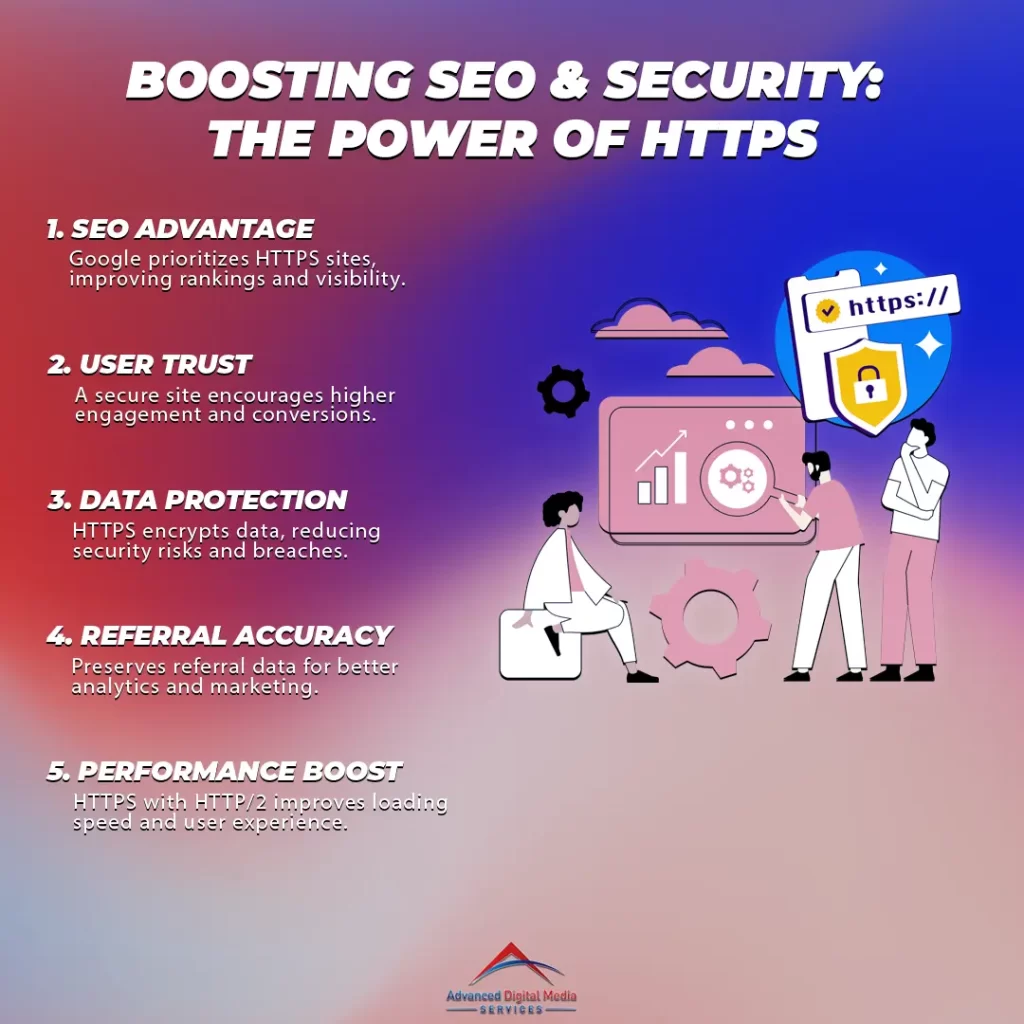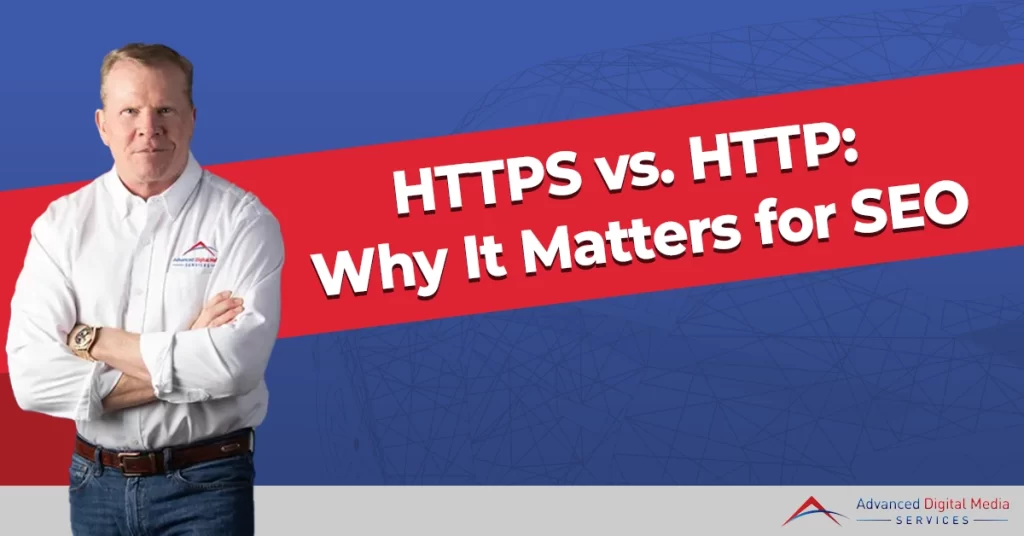When it comes to SEO, choosing HTTPS over HTTP is essential. HTTPS encrypts data, enhancing security and boosting user trust, which search engines favor in rankings. Google considers HTTPS a significant ranking signal, helping you stand out in search results. Additionally, it guarantees accurate tracking of referral data for better analytics. By prioritizing HTTPS, you safeguard user information and improve your website’s credibility. There’s much more to discover about its impact on your site’s performance and security.

Key Takeaways
- HTTPS is a ranking signal for Google, helping websites achieve higher search engine results.
- Secure connections via HTTPS build user trust, leading to increased engagement and retention.
- HTTPS protects user data through encryption, reducing the risk of data breaches.
- Switching to HTTPS preserves referral data, ensuring accurate traffic analysis for better insights.
- HTTPS can improve loading times with HTTP/2, enhancing overall user experience and SEO.
Understanding HTTP and HTTPS
When it comes to online communication, understanding the difference between HTTP and HTTPS is essential. HTTP stands for Hypertext Transfer Protocol, while HTTPS adds a layer of security with encryption. Knowing these protocols can help you make informed decisions about your website’s performance and security.
Defining HTTP and HTTPS Protocols
In the domain of web communication, HTTP (Hypertext Transfer Protocol) and HTTPS (Hypertext Transfer Protocol Secure) play essential roles in how data is transmitted across the internet. When you use HTTP, your data is transferred in plain text, which makes it susceptible to attackers’ interception. On the other hand, HTTPS encrypts your data, offering an additional layer of security. This is where the http vs https debate comes into play, as many users prefer the security that HTTPS provides. Understanding the https vs http difference is significant for both users and webmasters, as it impacts not just security but also SEO rankings. Websites utilizing HTTPS often rank higher, making it important for anyone serious about their online presence.
Key Differences Between HTTP and HTTPS
While both HTTP and HTTPS serve the same fundamental purpose of transmitting data between a user’s browser and a web server, there are essential differences that set them apart. Understanding the HTTP vs HTTPS difference is important, especially for SEO. Here are some key distinctions:
- Security: HTTPS encrypts data, providing a secure connection, while HTTP transmits data in plain text.
- SEO Benefits: Search engines, like Google, prefer HTTPS, boosting your site’s ranking in search results.
- User Trust: Users are more likely to trust HTTPS sites, increasing engagement and conversions.
- Performance: HTTPS can enhance site performance via HTTP/2, leading to faster loading times.
Choosing HTTPS over HTTP is essential for your site’s security and SEO success.
The Importance of HTTPS for SEO
When you’re considering your website’s SEO, it’s essential to understand Google’s stance on HTTPS as a ranking signal. Switching to HTTPS not only boosts your search rankings but also impacts how you track referral data and site analytics. This secure protocol can enhance user trust, which is important for your site’s success.
Google’s Stance on HTTPS as a Ranking Signal
Google clearly prioritizes HTTPS as a significant ranking signal, making it essential for any website aiming to improve its SEO performance. By switching from HTTP to HTTPS, you not only enhance security but also signal to Google that your site is trustworthy. This can lead to better visibility in search results.
Consider these key points about HTTPS and SEO:
- Trustworthiness: HTTPS helps build trust with users, encouraging them to engage with your content.
- SEO Boost: Sites using HTTPS may rank higher compared to their HTTP counterparts.
- User Experience: Secure connections improve user confidence and retention.
- Data Protection: HTTPS encrypts data, safeguarding user information from potential threats.
Understanding the difference between HTTP vs HTTPS meaning is essential for optimizing your site’s performance.
Impact on Referral Data and Site Analytics
Implementing HTTPS not only secures your website but also greatly impacts your referral data and site analytics. When you switch from HTTP to HTTPS, you improve your site’s performance regarding data accuracy and tracking. With HTTPS, referral data is preserved, allowing you to see where your traffic is coming from. This is vital for understanding your audience and optimizing your marketing strategies. Conversely, using HTTP can lead to loss of referral information, which can skew your analytics. By prioritizing HTTPS, you enhance your overall SEO efforts, as accurate data is essential for evaluating your site’s effectiveness. In the debate of HTTPS vs. HTTP SEO, the benefits to site analytics cannot be overlooked, particularly regarding HTTP vs. HTTPS performance.
Enhancing User Trust and Security with HTTPS
When you switch to HTTPS, you’re not just improving your site’s SEO; you’re also protecting your users’ data through encryption. This added layer of security helps build credibility and trustworthiness, making visitors feel safer when interacting with your site. Ultimately, a secure website can lead to higher engagement and conversion rates.
Protecting User Data Through Encryption
Encryption plays an essential role in protecting user data, making HTTPS a key component for any website. When you choose HTTPS over HTTP, you’re not just improving your SEO; you’re enhancing the security and trustworthiness of your site. This encryption guarantees that sensitive information, like passwords and credit card details, remains confidential.
Here are some benefits of using HTTPS:
- Protects user data from eavesdroppers
- Builds trust with customers, encouraging engagement
- Improves SEO rankings in the SEO http vs https debate
- Reduces the risk of data breaches
Switching to HTTPS isn’t just a technical upgrade; it’s about safeguarding your users’ information and establishing a secure browsing experience. Choose wisely between HTTPS vs HTTP for your website’s future.
Building Credibility and Trustworthiness
Trust is an essential element in the online landscape, and using HTTPS greatly enhances your website’s credibility. When users see that little padlock icon in their browser, they feel secure, knowing their data is protected. In the battle of http vs https SEO, HTTPS wins not just in security but also in trustworthiness. Search engines recognize this, often ranking HTTPS sites higher than their HTTP counterparts. So, what is HTTPS vs HTTP? HTTPS encrypts data between the user’s browser and your server, ensuring privacy and integrity. This not only boosts your SEO but also encourages visitors to engage with your content. Building that trust can lead to higher conversion rates and loyal customers, making HTTPS an essential choice for any website.
Frequently Asked Questions
How Can I Check if My Site Uses HTTPS?
You can check if your site uses HTTPS by looking at the URL in your browser’s address bar. If it starts with “https://,” then you’re secure; if not, your site is using HTTP.
Does HTTPS Affect Website Loading Speed?
Yes, HTTPS can slightly affect loading speed, but the difference is often negligible. In fact, many users find that secure sites load just as quickly, if not faster, due to optimizations implemented by modern web servers.
Is SSL Certification Necessary for HTTPS?
Imagine sailing smoothly across digital waters; SSL certification’s your sturdy ship. It’s necessary for HTTPS, ensuring secure connections. Without it, you risk data breaches, losing trust, and steering through a stormy sea of insecurity.
Can I Switch From HTTP to HTTPS Easily?
You can switch from HTTP to HTTPS relatively easily, but it requires updating your website’s configuration, obtaining an SSL certificate, and ensuring all links and resources are secure. Testing afterward is essential for a smooth changeover.
Will HTTPS Improve My Website’s Search Rankings?
Did you know that 70% of users prefer websites with HTTPS? By switching to HTTPS, you’re not only enhancing security but also boosting your chances of better search rankings, making it a smart move for your site.
Conclusion
In the grand tapestry of digital marketing, switching to HTTPS isn’t just a mere technical upgrade—it’s your golden ticket to a safer, more trustworthy online presence. By embracing this change, you’re not only protecting your users’ data but also weaving a stronger bond of trust with them. Plus, with search engines favoring secure sites, you’re giving yourself a leg up in the competitive arena of SEO. Why not seize the opportunity and steer your site towards achieving its full potential?ts full potential?






